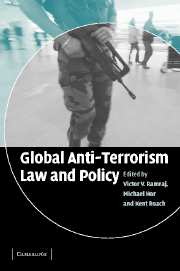Book contents
- Frontmatter
- Contents
- List of contributors
- Acknowledgements
- 1 Introduction
- PART ONE Theoretical Perspectives on Anti-Terrorism Law and Policy
- PART TWO A Comparative Study of Anti-Terrorism Measures
- PART THREE Anti-Terrorism Law and Policy in Asia
- PART FOUR Regional Cooperation
- PART FIVE Anti-Terrorism Law and Policy in the West
- PART SIX Anti-Terrorism Measures in Africa, the Middle East and Argentina
- 25 Terrorism and governance in South Africa and Eastern Africa
- 26 Rocks, hard places and human rights: anti-terrorism law and policy in Arab states
- 27 Terrorism in Argentina: government as its own worst enemy
- 28 Postscript: Some recent developments
- Index
25 - Terrorism and governance in South Africa and Eastern Africa
Published online by Cambridge University Press: 21 July 2009
- Frontmatter
- Contents
- List of contributors
- Acknowledgements
- 1 Introduction
- PART ONE Theoretical Perspectives on Anti-Terrorism Law and Policy
- PART TWO A Comparative Study of Anti-Terrorism Measures
- PART THREE Anti-Terrorism Law and Policy in Asia
- PART FOUR Regional Cooperation
- PART FIVE Anti-Terrorism Law and Policy in the West
- PART SIX Anti-Terrorism Measures in Africa, the Middle East and Argentina
- 25 Terrorism and governance in South Africa and Eastern Africa
- 26 Rocks, hard places and human rights: anti-terrorism law and policy in Arab states
- 27 Terrorism in Argentina: government as its own worst enemy
- 28 Postscript: Some recent developments
- Index
Summary
Introduction
It has become axiomatic that terrorists, who have no respect for international borders, can be countered only through an internationally coordinated programme. For this reason, the Security Council of the United Nations has invoked its powers under Chapter VII of the UN Charter to insist that states cooperate in regional and international anti-terrorism efforts in addition to setting up domestic anti-terrorism regimes. This chapter examines the main features of the anti-terrorism regimes of four African states, namely, South Africa, Uganda, Tanzania and Kenya, all of which have had some experience of terrorism. It sets their anti-terrorism legislation in the international and regional context to establish how each state has integrated itself into the wider anti-terrorist framework. What emerges from this study is that the anti-terrorism regime in the four states has come to be dominated not only by the executive branches of government, but also by the powerful executive branches of other governments and the executive-like powers of the UN Security Council.
The international and regional anti-terrorism regime
UN Security Council Resolution 1373 of 2001, issued under Chapter VII of the UN Charter, requires all states to refrain from providing support of any kind to terrorist groups and to prevent terrorist acts through early warning systems and mutual assistance in investigation and prosecution. States must establish and prosecute a range of terrorist offences within their domestic criminal justice system and must suppress recruitment to terrorist groups. These measures must combat both terrorism stricto sensu and organized crime, which is seen to have an intimate connection to terrorism.
- Type
- Chapter
- Information
- Global Anti-Terrorism Law and Policy , pp. 555 - 580Publisher: Cambridge University PressPrint publication year: 2005
- 2
- Cited by



